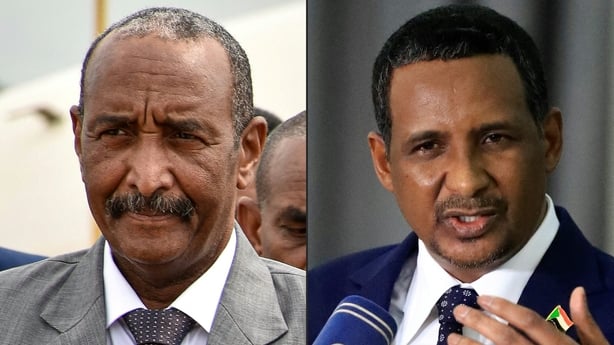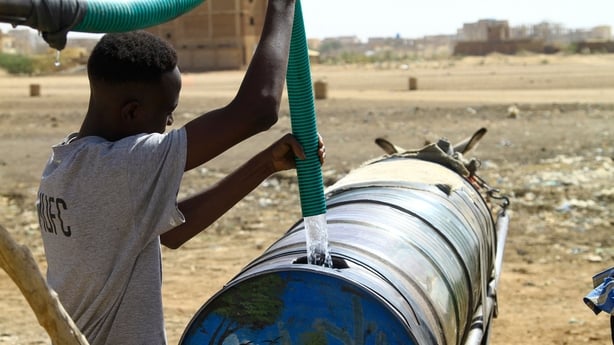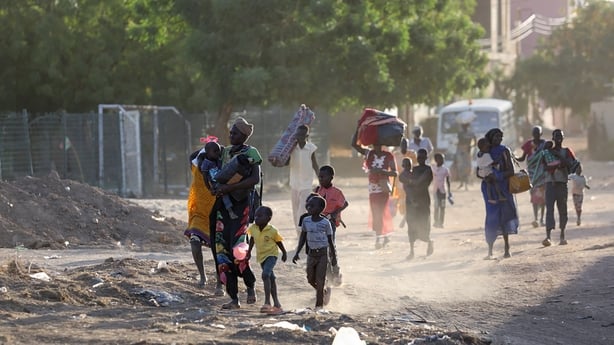Foreign countries are rushing to evacuate their nationals from battle-torn Sudan where deadly fighting raged into a second week between forces loyal to two rival generals.
Both France and Germany said they had begun evacuation operations that would assist European citizens and other nationals as well.
Around 100 people of multiple nationalities have been evacuated from Sudan on a first French flight out of the war-hit country after a "complicated" rescue operation, a French foreign ministry official said.
A second flight of another 100 people is expected to leave this evening, also heading to Djibouti, the official told reporters on condition of anonymity, adding that the evacuees had to cross the frontline of fighting around the capital Khartoum to board the planes.
It follows a Cabinet meeting convened by the Taoiseach.
The armed members of the Defence Forces will first fly to nearby Djibouti. They will be there to carry out humanitarian work.
There are up to 150 Irish passport holders in Sudan.
As gunfire again echoed through Khartoum and fighter jets roared above, foreigners also fled the capital in a long United Nations convoy, while millions of frightened residents hunkered down inside their homes, many running low on water and food.
Across the city of five million, army and paramilitary troops have fought ferocious street battles since 15 April, leaving behind charred tanks, gutted buildings and shops that have been looted and torched.
More than 420 people have been killed and thousands wounded, according to UN figures, amid fears of wider turmoil and a humanitarian disaster in one of the world's poorest nations.
Read More:
Irish EU Ambassador to Sudan 'assaulted' in his home
Explainer: Who is fighting in Sudan?
US special forces launched a rescue mission early Sunday for around 100 embassy staff and their relatives, swooping in with Chinook helicopters to fly them to a military base in Djibouti.
US President Joe Biden condemned the violence, saying it is "unconscionable and it must stop".
British Prime Minister Rishi Sunak said UK forces had also evacuated diplomats and their families "amid a significant escalation in violence and threats to embassy staff".

Long convoys of UN vehicles and buses were seen leaving Khartoum heading east to Port Sudan on the Red Sea, 850km away by road, carrying "citizens from all over the world", according to one Sierra Leonean evacuee.
Taking advantage of a recent brief lull in fighting, residents of Khartoum rushed to organise buses out, mainly north to Egypt, sharing drivers' numbers, safe routes, and advice on visa restrictions on social media.

The fighting broke out on 15 April between forces loyal to army chief Abdel Fattah al-Burhan and his deputy turned rival Mohamed Hamdan Daglo, who commands the powerful paramilitary Rapid Support Forces (RSF).
Daglo's RSF emerged from the Janjaweed fighters whom former strongman Omar al-Bashir unleashed in the Darfur region, where they were accused of war crimes including genocide.
The military toppled Bashir in April 2019 following mass citizen protests.
The two generals seized power in a 2021 coup, but later fell out in a bitter power struggle, most recently centred on the planned integration of the RSF into the regular army.
Multiple truces have been agreed in recent days and ignored.
Khartoum's airport, where the blackened hulls of destroyed aircraft lie on runways, is under the control of the RSF.
At least one jailbreak has taken place in the capital, according to lawyers.
Reports of prisoners also being freed from two other prisons, including the Kober jail where Bashir has been held, could not be independently verified.

In Khartoum, the conflict has left terrified civilians sheltering inside their homes, with power largely off amid sweltering heat and the internet out for most.
"We were living in darkness... first we didn't have water and then we didn't have power," Khartoum resident Awad Ahmad Sherif said.
"We ask God for our safety."
Pope Francis renewed calls "for the violence to stop as quickly as possible and for dialogue to resume".
Fighting has broken out elsewhere across Sudan, Africa's third biggest nation.
Battles have raged in Darfur, where aid group Doctors Without Borders (MSF) said their medics had been "overwhelmed" by the number of patients with gunshot wounds, many of them children, in the city of El Fasher.
Some hospitals have been shelled and others ransacked, with more than two-thirds of hospitals in Khartoum and neighbouring states "out of service", the doctors' union said.
In the first large evacuation, more than 150 Saudi citizens and nationals from 12 other countries reached Saudi Arabia by sea on Saturday.
Turkey began rescue operations at dawn Sunday via road from the southern city of Wad Madani, but the effort was postponed from one site in Khartoum after explosions near a mosque designated as the assembly area, the embassy said on Twitter.
European countries including Italy, the Netherlands and Greece also said they were planning rescue efforts.
The scramble by foreigners to escape has heightened fears among Sudanese of what will happen when diplomats who could act as potential mediators have gone.
"Pushing for safe passages to evacuate internationals without simultaneously pushing to end the war will be terrible", said researcher Hamid Khalafallah.
"International actors will have less impact once they're out of country," he said, adding in a message to foreign nations: "Do all you can to leave safely, but don't leave the Sudanese people behind unprotected."

